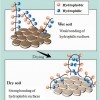Abstract
Water-repellent soils are unable to effectively adsorb or retain water. On these soils, water may simply pool on the surface or may move down preferred pathways, leaving large amounts of soil dry even when a large volume of water is applied. Thus, managing water and nutrients in sandy soils is often challenging. This 6-page fact sheet provides an overview of surfactants and how they may be used to better manage water and nutrients in sandy soils for vegetable and fruit production. Written by Guodong Liu, Monica Ozores-Hampton, Gene McAvoy, Ben Hogue, and Crystal A. Snodgrass, and published by the UF Department of Horticultural Sciences, December 2013.
http://edis.ifas.ufl.edu/hs1230
References
Arriaga, F. J., B. Lowery, and K. A. Kelling. 2009. "Surfactant Impact on Nitrogen Utilization and Leaching in Potatoes." American Journal of Potato Research 86 (5): 383-390. https://doi.org/10.1007/s12230-009-9093-z
DeBano, L. F. 2000. "Water Repellency in Soils: A Historical Overview." Journal of Hydrology 231-232: 4-32. https://doi.org/10.1016/S0022-1694(00)00180-3
Dekker, L. W., K. Oostindie, and C. J. Ritsema. 2005. "Exponential Increase of Publications Related to Soil Water Repellency." Australian Journal of Soil Research 43: 403-441. https://doi.org/10.1071/SR05007
Doerr, S. H., and A. D. Thomas. 2000. "The Role of Soil Moisture in Controlling Water Repellency: New Evidence from Forest Soils in Portugal." Journal of Hydrology 231-232: 134-147. https://doi.org/10.1016/S0022-1694(00)00190-6
Ghadim, A. K. A. 2003. "Water Repellency: A Whole-Farm Bio-Economic Perspective." In Soil Water Repellency: Occurrence, Consequences, and Amelioration, edited by C. J. Ritsema and L. W. Dekker, 303-312. Amsterdam, The Netherlands: Elsevier Science. https://doi.org/10.1016/B978-0-444-51269-7.50030-8
Ghebru, M. G., E. S. duToit, and J. M. Steyn. 2007. "Water and Nutrient Retention by Aquasoil® and Stockosorb® Polymers." South African Journal of Plant and Soil 24 (1): 32-36. https://doi.org/10.1080/02571862.2007.10634778
Hall, D. 2009. "Water Repellence." Managing South Coast Sandplain Soils to Yield Potential. Department of Agriculture and Food, Western Australia (DAFWA), Bulletin 4773: 48-63.
Hallett, P. D. 2008. "A Brief Overview of the Causes, Impacts and Amelioration of Soil Water Repellency: A Review." Soil and Water Research 3 (Special Issue 1): S21-S29. https://doi.org/10.17221/1198-SWR
Horne, D. J., and J. C. McIntosh. 2003. "Hydrophobic Compounds in Sands from New Zealand." In Soil Water Repellency: Occurrence, Consequences, and Amelioration, edited by C. J. Ritsema and L. W. Dekker, 25-36. Amsterdam, The Netherlands: Elsevier Science. https://doi.org/10.1016/B978-0-444-51269-7.50005-9
Jamison, V. C. 1942. "The Slow Reversible Drying of Sandy Surface Soils Beneath Citrus Trees in Central Florida." Soil Science Society of America Proceedings 7: 36-41. https://doi.org/10.2136/sssaj1943.036159950007000C0006x
Letey, J., M. J. K. Carrillo, and X. P. Pang. 2003. "Characterizing the Degree of Repellency." In Soil Water Repellency: Occurrence, Consequences, and Amelioration, edited by C. J. Ritsema and L. W. Dekker, 51-56. Amsterdam, The Netherlands: Elsevier Science. https://doi.org/10.1016/B978-0-444-51269-7.50007-2
Madsen, M. D., E. G. Coronel, and B. G. Hopkins. 2012. "Soil Surfactant Products for Improving Hydrologic Function in Post-Fire Water-Repellent Soil." Soil Science Society of America Journal 77 (5): 1825-1830. https://doi.org/10.2136/sssaj2012.0305
McHale, G., N. J. Shirtcliffe, M. I. Newton, and F. B. Pyatt. 2007. "Self-Organization of Hydrophobic Soil and Granular Surfaces." Applied Physics Letters 90 (5): 054110-054110-3. https://doi.org/10.1063/1.2435594
Oostindie, K., L. W. Dekker, J. G. Wesseling, C. J. Ritsema, and D. Moore. 2012. Influence of a Single Soil Surfactant Application on Potato Ridge Moisture Dynamics and Crop Yield in a Water Repellent Sandy Soil. I. (ISHS) 938: 341-346. http://www.actahort.org/books/938/938_44.htm. https://doi.org/10.17660/ActaHortic.2012.938.44
Park, D. M., J. L. Cisar, K. E. Williams, and G. H. Snyder. 2004. "Alleviation of Soil Water Repellency in Sand Based Bermudagrass in South Florida." Acta Hortculturae 661: 111-115. https://doi.org/10.17660/ActaHortic.2004.661.13
Sarvaš, M. 2003. "Effect of Desiccation on the Root System of Norway Spruce (Picea abies [L.] Karst.) Seedlings and a Possibility of Using Hydrogel STOCKOSORB® for Its Protection." Journal of Forest Science 49 (11): 531-536. https://doi.org/10.17221/4796-JFS
Wahl, N. A. 2008. "Variability of Water Repellency in Sandy Forest Soils under Broadleaves and Conifers in NorthWestern Jutland/Denmark." Soil & Water Research (Special Issue 1): S155-S164. https://doi.org/10.17221/1407-SWR
Wander, I. W. 1949. "An Interpretation of the Cause of Water-Repellent Sandy Soils Found in Citrus Groves of Central Florida." Science 110 (2856): 299-300. https://doi.org/10.1126/science.110.2856.299
Unless otherwise specified, articles published in the EDIS journal after January 1, 2024 are licensed under a Creative Commons Attribution-NonCommercial-NoDerivs 4.0 International (CC BY-NC-ND 4.0) license.

